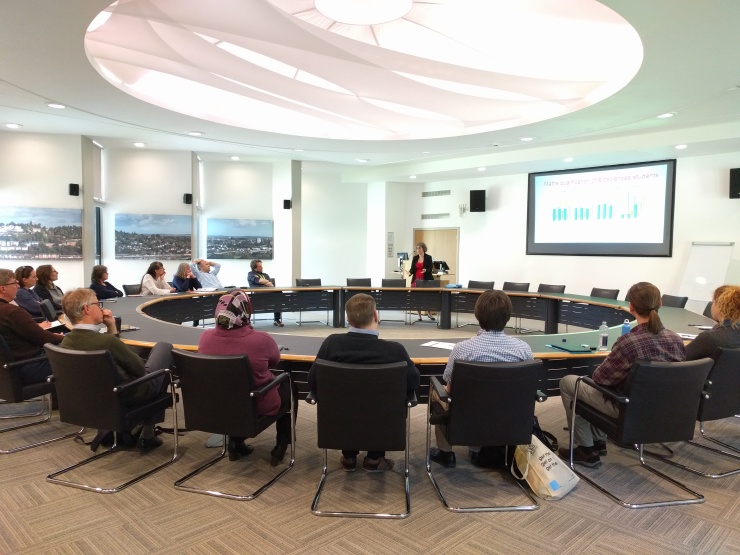Dr Alison Hill (Senior Lecturer in Biosciences and Education Exeter Incubator Fellow)
 This week, colleagues from across the university gathered together to share good practices with Exeter Incubator Fellow, Dr Alison Hill as part of the Academic Practice Network. Hill shared with her colleagues a recent project that focuses on providing additional support targeted at students that are lacking fundamental math skills. This is a topic that seems to resonate across colleges, further identifying math skills as a foundation of research, science and business related modules.
This week, colleagues from across the university gathered together to share good practices with Exeter Incubator Fellow, Dr Alison Hill as part of the Academic Practice Network. Hill shared with her colleagues a recent project that focuses on providing additional support targeted at students that are lacking fundamental math skills. This is a topic that seems to resonate across colleges, further identifying math skills as a foundation of research, science and business related modules.
Hill’s research began by observing a correlation across students who have completed A Level Maths before coming to university, and a high academic achievement across select modules. After further examining, Hill found a statistically significant difference that these students were more likely to achieve a grade boost (i.e. first class) and it protected students from a poor grade (e.g. much less likely to get a Third class/Fail grade). Modules such as Bioinformatics and Physical Chemistry had the most pronounced effect. This generated further questioning of whether math lessons are an effective tool for developing advanced levels of problem solving skills, which can have a broad impact on academic achievement. Hill found this correlation across the biosciences discipline. This led Hill to explore offering interventions targeted towards students who had the lowest math skills. Since then, modules within the disciple have implemented optional in-person math tutorials and online ELE math based questions which are targeted towards supporting students who score lower on math skills.
There was much discussion on this topic, due to colleagues recognising math skills as a universal ‘gap creator’ across colleges. Informal feedback recognises the usefulness of having the Academic Practice Network as a space to meet many colleagues from other areas – and bring together ideas for wider consideration. With that said this inspired much discussion of students being properly equipped with math skills focused on ‘understanding’ versus ‘replicating’, the culture of it being okay to admit that you are ‘not good at maths’, and an open debate on how to create interventions that focus on struggling students, versus top achieving students.
These questions all tie in quite tightly to Hill’s project, and I am sure I can speak for all attendees, that we are eagerly looking forward to see how the project unfolds once the academic year draws to a close.
